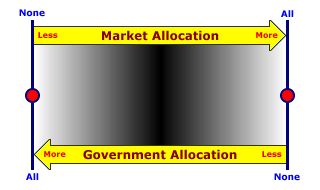
|
|
IMPLICIT LOGROLLING: A type of voter logrolling in which two separate programs or policies are combined into a single package, which is then subject to a single vote. With implicit logrolling, each voter is "on record" only for the entire package and thus can contend that a vote was cast only for "their" favored program. Implicit logrolling is commonly used by legislators to trade votes without appearing to trade votes. Legislators can come out in support of "their" programs, while simultaneously being against "other" programs, even though they actually voted for the "other" programs by voting for "their" programs, but they didn't really want to vote for the "other" programs and only voted for the "other" programs to ensure passage of "their" programs. An alternative type of logrolling is explicit logrolling.
Visit the GLOSS*arama
|
|


|

|
                           PURE COMMAND ECONOMY: An economy, or economic system, that relies exclusively on governments to allocate resources and to answer all three questions of allocation. This theoretical ideal has no markets, government makes all allocation decisions. Then contrasting theoretical ideal is a pure market economy in which markets make all allocation decisions. | Economic Systems |  |
A pure command economy is a theoretical extreme on the spectrum of economic systems that does not actually exist in the real world. It does, however, provide a benchmark that can be used for comparison with real world economic systems. In pure command economies, governments force all allocation through involuntary taxes, laws, restrictions, and regulations. Governments set forth the laws and rules. If folks do not follow the rules, then they are punished. Governments can punish those who do not follow the rules because... well... because they are the governments. Given a choice, most humans probably would rather NOT pay taxes or have their cars safety inspected. They follow government rules because they have to, because that IS the law. The real world embodiment of a pure command economy is termed a command economy. The communistic/socialist economies of China and the former Soviet Union are primary examples of command economies. While, in theory, resource allocation could be undertaken exclusively through markets or governments, in the real world, all economies rely on a mix of both markets and governments for allocation decisions, what is termed a mixed economy.

Recommended Citation:PURE COMMAND ECONOMY, AmosWEB Encyclonomic WEB*pedia, http://www.AmosWEB.com, AmosWEB LLC, 2000-2025. [Accessed: July 18, 2025].
Check Out These Related Terms... | | | | | | | |
Or For A Little Background... | | | | |
And For Further Study... | | | | | | |
Search Again?
Back to the WEB*pedia
|



|

|
ORANGE REBELOON
[What's This?]
Today, you are likely to spend a great deal of time wandering around the downtown area trying to buy either shoe laces for your snow boots or a rim for your spare tire. Be on the lookout for the happiest person in the room.
Your Complete Scope
This isn't me! What am I?
|

|
|
A lump of pure gold the size of a matchbox can be flattened into a sheet the size of a tennis court!
|

|
|
"A winner is someone who recognizes his God-given talents, works his tail off to develop them into skills, and uses those skills to accomplish his goals. " -- Larry Bird, basketball player
|

|
SIPP
Survey of Income and Program Participation
|

|
|
Tell us what you think about AmosWEB. Like what you see? Have suggestions for improvements? Let us know. Click the User Feedback link.
User Feedback
|


|


